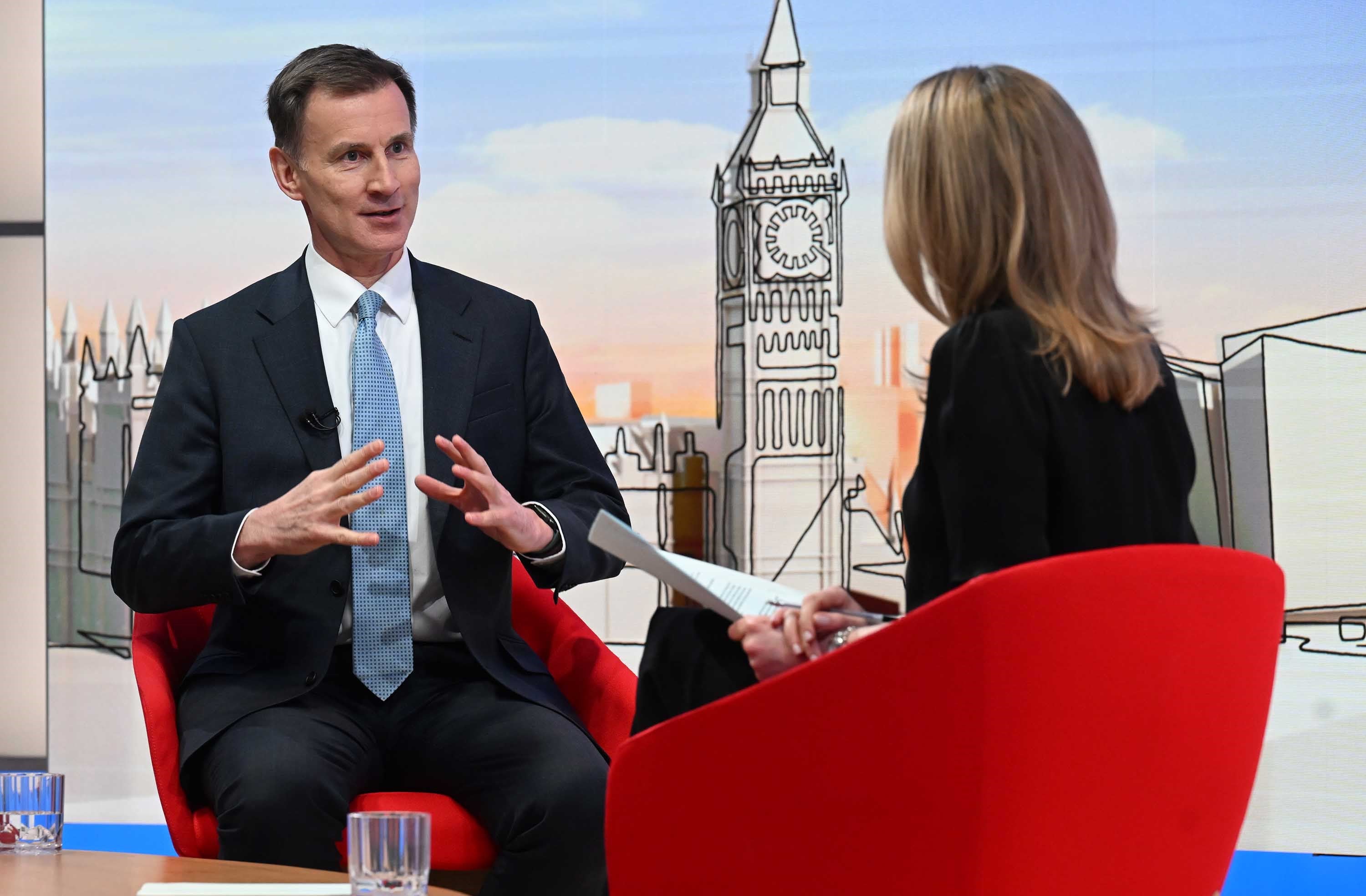Tax cuts will plunge thousands into poverty, warn think tanks ahead of spring Budget
Economic think tanks have called for the chancellor to re-think his fiscal policy and instead invest in public services
Thousands of families will be plunged into poverty if the chancellor cuts national insurance in the spring Budget, think tanks have warned.
On Wednesday Jeremy Hunt will unveil his final Budget before the next general election, where it is widely anticipated that he will cut taxes in a last-ditch attempt to win back voters.
Mr Hunt has hinted that a further national insurance tax cut could be on the cards, as he told Sky News that his last cut of the contribution in the autumn statement in November was a “turning point” and he “hopes to make some progress on that journey” on Wednesday.

But now two think tanks have warned the chancellor against further reductions. They say poorer households will benefit little from the tax cut while suffering a sharp drop in the services on which they rely.
The Institute for Public Policy Research (IPPR) said that a further 2p cut in the pound would cost the government £10.4bn, and almost half of that would end up in the pockets of the richest 20 per cent of households, while a meagre 3 per cent of the funding would benefit the poorest 20 per cent of families.
The progressive think tank’s analysis also shows a disproportionate regional inequality, meaning that households in London would receive £608 on average, whereas households in the northeast would see average gains as low as £342.
The New Economics Foundation (NEF) has cautioned that even a 1p tax cut – which the treasury is said to be actively considering – would cost the government £4.8bn, with almost half going to the richest households – while the poorest receive just £160m.
This means that the wealthiest will receive 12 times more than the poorest, with those on the highest incomes receiving an additional £424 per year compared to £34 per year for those on the lowest.
Further analysis by the NEF shows that this cut would push 55,000 more people into relative poverty. If that amount were invested into universal credit it could instead lift 384,000 people out of poverty with an additional £720 per year.
Sam Tims, senior economist at NEF, said that the chancellor is “pushing for tax cuts that the country does not want and that will benefit those who already have the most”.
“Not only will this reduce government income in the immediate future, but it will also worsen inequality making us all poorer and harming the country’s prospects.”
He added: “The responsible way of running our economy is to borrow to make smart investments that boost our economy and improve people’s lives. We should raise money by increasing taxes on the very wealthiest. Investing in our schools, hospitals, housing, and income safety net creates economic benefits and helps everybody live happier, healthier lives.”
The chancellor has maintained that he hopes to use the budget to “show a path” in the direction of tax cuts, but stressed any reductions in taxation would have to be “prudent”.
But the government’s tax-cutting plans have received caution from economists who have warned about the impact they may have on public services.

The International Monetary Fund (IMF) said that tax cuts would be “very challenging to achieve” considering Britain’s ageing population and mounting debt pile, while the Institute for Fiscal Studies (IFS) said the chancellor should not announce the tax cuts unless he can “provide more detail on its spending plans”.
Recent forecasts from the Office for Budget Responsibility (OBR) have given the chancellor less fiscal headroom than previously thought, leading him to consider unexpected tax rises such as abolishing the non-dom tax status.
Dr George Dibb, associate director for economic policy and head of the Centre for Economic Justice at IPPR, said that tax cuts are “not in the public interest, nor the interest of the economy”.
Speaking to The Independent, Dr Dibb said the public don’t want tax cuts “because they know they have been made at the expense of day-to-day spend public services as well as future capital investment”.
“The prioritisation of taxation above all else is a sign that the government understands that people feel the country is not working.
“But the first manifestation of that is not taxes, it’s the fact they can’t get a GP appointment or an NHS dentist, or that you call an ambulance it might take 12 hours to arrive. Those are things are far more pressing for the average voter than their tax bill.
He added: “I think that we should recognise that public services are a core part of the economy and how people feel about the economy, and that the priority for the country should be investing in those.”
Despite warnings about squeezed public services, Mr Hunt has maintained that the government will control public spending so it can prioritise tax cuts.
The chancellor told the BBC that he didn’t believe in “forever expanding the welfare state” because “I don’t think that’s compatible with bringing the tax burden down in a society that makes work pay”.

Last month left-wing think tank the Resolution Foundation warned that the chancellor’s current spending projections mean that increasing day-to-day spending on public services by 1 per cent was a “fiscal fiction”.
It explained that given health, education and defence budgets are all protected, unprotected departments, such as the Home Office, Ministry of Justice and local government will see per capita cuts of 17 per cent by 2028-29.
Speaking to Times Radio, Mr Hunt said: “It’s wrong to say the only way to improve public services is by putting more money in.”
Darren Jones MP, Labour’s shadow chief secretary to the treasury, said that “no matter what the chancellor does in the budget this week, working people will be worse off thanks to 14 years of Tory failure”.
The Liberal Democrats have called on Mr Hunt to pledge more funding for the NHS and “put health at the heart of the budget”.
Liberal Democrat treasury spokesperson Sarah Olney MP said: “This chronic neglect of our health services by successive Conservative ministers is creating a sick economy and preventing our great country from reaching its full potential.”
She added: “Jeremy Hunt needs to put health at the heart of the Budget and cancel his disastrously short-sighted cuts to NHS spending. We cannot get the economy firing on all cylinders again without fixing the health crisis, tackling the NHS backlog and helping people back to work.”
A Treasury spokesperson said: “This year’s cut to national insurance saves the average earner £450 per year and since 2010 we have taken 3 million people out of paying tax altogether. We will not speculate on whether further tax cuts will be affordable in the upcoming Budget.”
Join our commenting forum
Join thought-provoking conversations, follow other Independent readers and see their replies
Comments
Bookmark popover
Removed from bookmarks